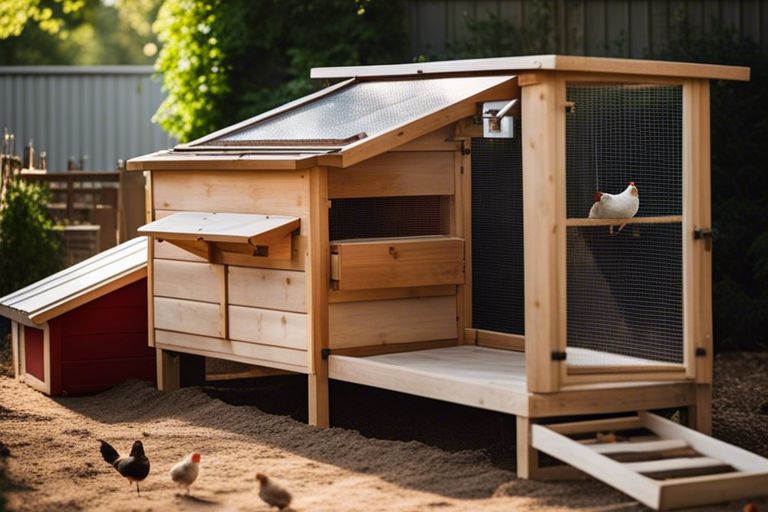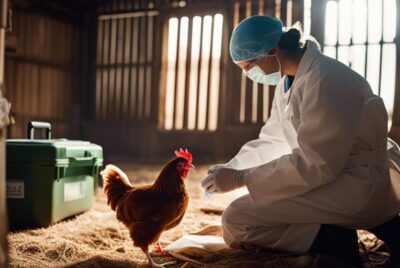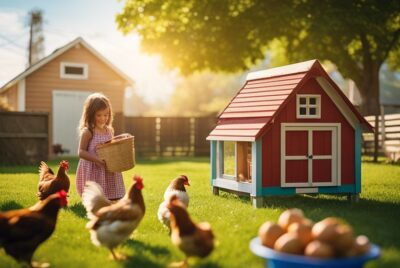Coop Cleaning 101 – Maintaining a Hygienic Environment
Keeping your coop clean is essential for maintaining a healthy environment for your poultry. Regular cleaning not only ensures a hygienic space for your birds but also helps prevent the spread of diseases. By following a few simple steps and establishing a cleaning routine, you can create a clean and safe coop for your feathered friends. In this article, we will discuss the importance of coop cleaning and provide you with tips and guidelines on how to maintain a hygienic environment for your birds.
Pre-Cleaning Preparations
Your coop cleaning routine should always start with some essential pre-cleaning preparations to ensure an efficient and effective cleaning process. By organizing your tools and supplies beforehand, as well as taking necessary safety measures, you can create a hygienic environment for your feathered friends.
Essential Cleaning Tools and Supplies
Cleaning your coop requires some basic tools and supplies to get the job done effectively. Make sure you have a sturdy rake or shovel for removing bedding and droppings, a broom for sweeping, a hose for rinsing, a scrub brush for stubborn stains, and a bucket of soapy water for cleaning surfaces. Additionally, keep a supply of gloves, masks, and trash bags on hand for protection and waste disposal.
Having these tools readily available will streamline the cleaning process and ensure that you can tackle any mess efficiently. Consider investing in a quality set of cleaning tools to make your coop maintenance easier and more effective in the long run.
Safety Measures and Protective Gear
Measures should be taken to protect yourself while cleaning the coop to prevent the spread of germs and pathogens. Wearing gloves, a mask, and appropriate footwear can help minimize contact with bacteria and parasites found in poultry droppings. These protective gear items should be designated for coop cleaning only to avoid cross-contamination with other areas of your home.
For instance, always wash your hands thoroughly after cleaning the coop and handling any soiled materials. This simple yet crucial step can help prevent the transmission of diseases from poultry to humans. By following safety measures and using protective gear, you can create a clean and healthy environment for both your chickens and yourself.
Cleaning Procedures
Assuming you want to maintain a hygienic environment in your coop, it is essential to follow proper cleaning procedures. By implementing regular cleaning routines, you can ensure the health and well-being of your flock.
Daily Maintenance Routines
With daily maintenance routines, consistency is key. Start by removing any soiled bedding from the coop floor and nesting boxes. This helps prevent the build-up of harmful bacteria and keeps the coop smelling fresh. Next, check and refill food and water containers to ensure your chickens have access to clean supplies throughout the day.
After attending to the basic needs of your flock, take a few minutes to inspect the coop for any signs of pests or damage. By addressing issues promptly, you can prevent infestations and maintain a secure environment for your chickens.
Deep Cleaning Processes
One of the most critical aspects of coop cleaning is the deep cleaning process. This should be done periodically to thoroughly sanitize the coop and remove any accumulated dirt or debris. Start by emptying the coop completely and scrubbing all surfaces with a poultry-safe disinfectant. Pay special attention to corners and crevices where bacteria can hide.
Cleaning the coop’s ventilation system is an essential part of the deep cleaning process. Ensure that vents are clear of obstructions and functioning correctly to provide adequate airflow for your flock.
Cleaning Tip: Consider using a pressure washer for deep cleaning larger coops to effectively remove stubborn dirt and grime.
Post-Cleaning Care
Despite the hard work put into cleaning the coop, proper post-cleaning care is essential to maintain a hygienic environment for your feathered friends. This involves regular waste disposal and composting, as well as monitoring for cleanliness and health.
Waste Disposal and Composting
Disposal of waste is a crucial step in coop cleaning. Remove soiled bedding, droppings, and any uneaten food promptly to prevent the buildup of harmful bacteria and odors. Consider setting up a composting system for organic waste. Composting not only helps in waste management but also produces nutrient-rich material that can be used in your garden.
Regularly turning the compost pile aerates it and speeds up the decomposition process. Keep a good balance of green (nitrogen-rich) and brown (carbon-rich) materials in the compost pile. This balanced mix will help maintain an optimal environment for beneficial microorganisms to break down the waste effectively.
Monitoring for Cleanliness and Health
Post-cleaning, it is important to routinely monitor the coop for cleanliness and the health of your birds. Perform regular checks for any signs of pests, mold, or moisture buildup. Inspect the bedding, nesting boxes, and feeders for cleanliness and structural integrity.
PostCleaning Regularly monitor the behavior and appearance of your flock. Look out for any changes in egg production, droppings, or unusual behavior that could indicate health issues. Address any concerns promptly to ensure the well-being of your chickens.
Composting: Composting is not only an eco-friendly way to manage waste but also a sustainable practice that benefits your garden and the environment. Proper composting can help reduce waste, improve soil quality, and enhance the overall health of your coop environment.
Troubleshooting Common Coop Cleaning Challenges
Dealing with Pests and Parasites
Parasites can be a major headache for chicken owners. Common pests like mites, lice, and worms can wreak havoc on your flock if left unchecked. To keep your coop free of these unwanted intruders, make sure to regularly inspect your chickens for any signs of infestation. Look out for feather loss, irritated skin, or decreased egg production, as these could be indicators of a parasite problem.
If you do discover that your chickens have been infested, there are various treatment options available. From natural remedies like diatomaceous earth and essential oils to commercial products specifically designed to combat parasites, there are plenty of solutions to choose from. Remember to thoroughly clean and disinfect your coop to prevent reinfestation after treating your chickens.
Addressing Odor and Moisture Issues
With proper ventilation and good coop design, you can effectively manage odor and moisture levels in your chicken coop. Poor ventilation can lead to a build-up of ammonia from chicken droppings, resulting in unpleasant odors and potentially harmful conditions for your flock. Ensure that your coop has adequate airflow to reduce moisture and keep the air fresh.
To further combat odor and moisture, consider using appropriate bedding materials such as straw, wood shavings, or sand. These materials can help absorb moisture and control odors in the coop, creating a more comfortable environment for your chickens. Regularly cleaning and replacing soiled bedding is also essential for maintaining a clean and healthy coop.
To maintain optimal conditions in your coop, it’s crucial to address any odor and moisture issues promptly. By staying proactive and implementing proper cleaning and ventilation practices, you can create a hygienic environment that promotes the well-being of your feathered friends.
Conclusion
Ultimately, maintaining a hygienic environment in a coop is crucial for the health and well-being of your poultry flock. By following the simple steps outlined in this article, such as regular cleaning, proper ventilation, and disinfection, you can prevent the spread of diseases and ensure a safe living space for your birds. Bear in mind, a clean coop not only promotes healthier chickens but also contributes to higher egg production and overall farm efficiency. Make coop cleaning a regular part of your routine to keep your flock happy and healthy.


